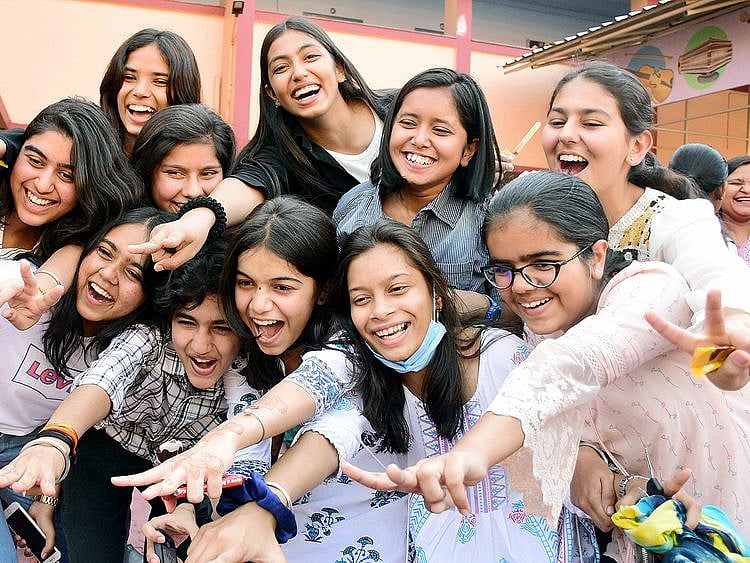Marks over matter: Why Class 12 grades don’t define your child
Celebrate your child’s success but also rejoice for the ones who did it their way

When it comes to social media there is a default setting, all conversations centred on its use and misuse whether it is a photo posted on the gram or screen time on a device are dismissed as child’s play.
But those who seek validation online are not just the young ones, on the contrary adults play social media with just as much aplomb if not obsession, a case in point the recently released class 12 board examination results in India.
In the last few days social media timelines have been littered with deliriously overjoyed families in what they portray as their moment of reckoning- their child’s glorious mark-sheet.
The results may be out, but the competition is only just beginning as families make a public spectacle of their child’s scores- note these are all only achievers- showing how we can’t change the system, nor the system can change us.
What these scores don’t reflect are background stories of intense pressure- back breaking and mental- that a flawed education system continues to foster as though it all begins and ends here, the journey notwithstanding.
A National Institute of Mental Health and Neuro Sciences (NIMHANS) study says one in every five teenagers in India suffers from a mental illness, and its main culprit is exam pressure.
With this public display of glee, the adults are complicit in allowing a mark- based system that pushes children to the edge to flourish at the expense of life skills. One would have thought the pandemic would have made the adults grow up. Why do we allow marks to matter so much? Many success stories have been written by those who didn’t make the cut.
Weight of expectations
In their thrill at their child securing 90% or above have these families given a thought to those who get left behind. In a pressure cooker environment, it doesn’t take much for the weight of expectations to filter down to the other students.
Nine students died by suicide within 48 hours in Andhra Pradesh after the class 11 and class 12 results were announced in April this year. Mental health and performance anxiety, it doesn’t take a professor to point out the obvious connect. 35 students die by suicide in India daily, should these posts then not be treated with caution?
Even before the birth of social media our society has celebrated doctors and engineers, their success mattered at the expense of their happiness and outside of this tunnel vision other careers, especially the creative arts remained on the sidelines.
Those studying differently are considered deviant and unsuccessful. Humanities and arts stream have for long been dismissed as subjects for those who are not intelligent enough to do sciences or economics. Who decides that?
As a society with a predominantly young demographic these biases and celebrations will stop so many children from realising not just their real potential but also living a childhood.
The glory of Indian- Americans winning the Spelling Bee cannot always be a coincidence nor is the ugly side of the mushrooming coaching centres in Rajasthan’s Kota hidden. This race to the top was always there, but advertised on social media its damage is limitless.
A nation for toppers?
What has complicated matters further is the mystifying evaluation methods. Scores have gone through the roof with an unfathomable 100% even in English literature.
The marking patterns have led to almost cent per cent cut-offs for college admissions in Delhi University and the competition for the limited seats is so ruthless that not all toppers get admission, where then is the average student expected to study? Are we only a nation for toppers?
Once the euphoria settles down, what next for these overachieving students? College is a clean slate but with such high scores they have already been shown the promised land before their time and without being set up for disappointment.
Success and failure are two sides of a coin, and it is the focus only on one that makes this generation trip at the slightest hurdle whether it is by self-harm or worse. Their parents’ posts show they haven’t learnt either.
Social media then is a boon for a pretentious society that puts more emphasis on what people say rather than how their own feel. Its everywhere, from hate speeches, fake information to self-glorification that adults crave competitively with their teenage kids. It is not that our children are being only taught, they are also watching.
Celebrate your child’s success but also rejoice for the one who isn’t the topper and did it his way. Contrary to what we see on social media there are no black or white binaries, some children just take a longer, different route.
When motivational speakers say this in a packed hall we applaud, yet once home we go back to comparisons and mapping a child with his scores.
‘Fishes asked to climb trees. Chart your own course in the big, wide ocean;’ a parent wrote a note after her child’s 60% in the final exams. There are some who have it right and their child is no less a success story.
Network Links
GN StoreDownload our app
© Al Nisr Publishing LLC 2026. All rights reserved.